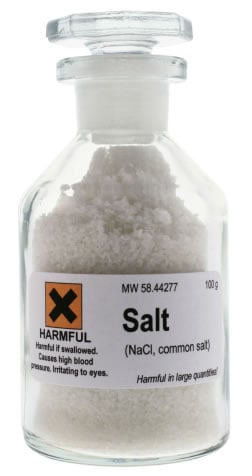Are low-sodium diets unhealthy?
Are low-sodium diets healthy? Two studies suggest a link between low-sodium intake and disease. Are they right? Find out from salt expert Jay Kenney, PhD, FACN, RD, Educator and Nutrition Research Specialist.

The media love drama. Headlines that make you scratch your head and ask, “Say, what?!”
We got several recently, such as “Low-Salt Diets May Pose Health Risks” and “Studies Question Need to Watch Salt.” They were referring to two studies in The New England Journal of Medicine.
Headlines like these lead us to believe that these studies seriously undermine current World Health Organization and U.S. recommendations to reduce sodium, the main component of salt.
Faulty science
But don’t believe the media hype. And don’t believe that all studies are created equal. Some have serious shortcomings, and that’s the case for these two new studies.
Unfortunately, too, sometimes physicians themselves do not realize the poor quality of the research they are reviewing. For example, in an accompanying editorial in NEJM, Dr. Suzanne Oparil of the University of Alabama enforced the studies’ conclusions about low-salt diets possibly causing harm.
But right off the bat, what’s really strange about these studies is that while they assert a link between low-sodium eating and disease, they also acknowledge that high-sodium eating leads to high blood pressure, or hypertension.
WebMD‘s Barbara Goodman quotes Dr. Martin O’Donnell, one of the study’s lead authors, as saying: “We’re not challenging the blood pressure contention here. We’re seeing it, too. We’re seeing a clear association between sodium intake and blood pressure.” But he asserts that at less than 6,000 milligrams a day, sodium intake does not seem to prevent heart attacks, congestive heart failure, strokes, or deaths.
Say, what?
Okay, let’s stop right here. The authors agree that higher salt intake (and anything over 3,000 milligrams is certainly higher salt intake) raises blood pressure, but mysteriously, this increased blood pressure does not translate into more deaths, heart disease, congestive heart failure, and stroke?
Does this not seem odd? Oddness like this happens when the science is poor.
PURE nonsense
The two studies Dr. O’Donnell and colleagues were involved in used data from the ongoing Prospective Urban Rural Epidemiology (PURE) study. Crunching the numbers on more than 100,000 people ages 35 to 70 years in 17 countries, they concluded that 3.1% of those who consumed between 3,000 and 6,000 milligrams of sodium daily either died or suffered congestive heart failure, heart attacks, or strokes. Among those eating less than 3,000 milligrams of sodium daily, 4.3% suffered the same.
At intake higher than 6,000 milligrams, the percentage of disease and deaths was 3.2%; above 7,000 millgrams, it was 3.3%.
A single urine test
But here’s problem #1 with their results. The authors estimated sodium intake based on a single morning urine collection. I believe my fellow Pritikin Scientific Advisory Board colleague Tom Rifai, MD, FACP, had the best response: “Really?! One single urine sample at the start of a short-term study, and we want to fight tons of direct clinical trial evidence proving that the more sodium we consume, the greater our risk of high blood pressure and a multitude of diseases?”
Very short study duration
As Dr. Rifai points out, another key problem with these studies was their very short length. The authors reached their conclusions based on an average of only 3.7 years, and what they found was strictly an association, not cause and effect. “In a short-term study like this,” explains Dr. Rifai, “low-sodium intake could have been a marker of disease and poor appetite.” In other words, it wasn’t the lower-sodium diet causing the diseases; the lower-sodium intake (and lower food intake overall) could simply have been a by-product of the diseases themselves.
“And likely,” notes Dr. Rifai, “some of those diseases, like heart failure, were brought on over the course of many decades by high sodium intake.”
Congestive heart failure
It is well known that many people who are sicker, and particularly those with failing hearts, are likely to be eating less food. Many will also be cutting back on salty foods because excessive dietary salt can cause fluid retention, which can make breathing difficult by causing lung congestion. Most people with congestive heart failure are expected to die over the next five years, and largely from cardiovascular disease. Were these authors not aware of such clinical observations?
Potassium-rich foods
One of the studies1 also observed that those with urine showing a low potassium content were significantly more likely to die. Foods rich in potassium, such as fruits, vegetables, potatoes, and beans, are indeed vital because they help blunt some of the toxic effects of sodium in the body.
Of course, the most obvious explanation for both a lower intake of potassium and a lower intake of sodium is that sicker people are simply eating less food. To this reviewer, this seems highly likely, but unfortunately, such an obvious explanation for their data seems to have largely escaped Dr. O’Donnell and the rest of the PURE research team.
Are low-sodium diets healthy? Yes.
High sodium + low potassium = higher blood pressure
The other study2 also found that people who consumed less potassium and more sodium had higher blood pressure on average, and this was particularly true in those who were older and had elevated blood pressure to begin with.
So these two new studies, despite their limitations of using a single morning urinary sample to estimate how much sodium and potassium their subjects were consuming, still observed that more salt (and less potassium) intake was significantly associated with higher blood pressure.
Higher blood pressure over the long term, study after study over the past several decades has affirmed, is the single greatest cardiovascular risk factor and predictor of earlier mortality.
“If you believe hypertension kills, and you should, it’s really tough to deny the results of superbly designed research like the DASH studies3 showing that healthy eating plus low sodium intake – optimally no more than 1,500 milligrams daily – markedly improves blood pressure, which should markedly reduce the risk of heart attack, stroke, and death,” sums up Dr. Rifai, who is Regional Medical Director, Metabolic Health & Weight Management for Henry Ford Health System.
.
“As a practicing physician, I’ve seen the ravages of high sodium in the clinic thousands of times, and no observational study is going to outweigh direct clinical trials. Believe me, serious nephrologists and cardiologists are both laughing and crying over these new studies, crying because these studies confuse their patients, potentially causing terrible increases in terrible diseases like strokes. Hypertension is the #1 cause of strokes.”
Hypertension accounts for more than 9 million deaths annually
Let’s return to Dr. Oparil’s NEJM editorial. It starts off fine. She states that more than 1 billion adults worldwide have hypertension, and that “hypertension accounts for more than 9 million deaths annually.” However, she then goes on to say that the new research does provide evidence that low levels of sodium excretion may be associated with an increased risk of death and cardiovascular-disease outcomes.
Reverse causation
Is Dr. Oparil not aware of reverse causation? In her statement above, she is inferring that eating less sodium may cause increased risk of death and disease. But as we discussed earlier, isn’t the reverse far more likely? Eating less sodium is not causing illness but is very likely the result of serious illness.
Dr. Oparil says that without a long-term clinical trial to show the safety and efficacy of salt reduction, “the results argue against reduction of dietary sodium as an isolated public health recommendation.” In his WSJ article, author Ron Winslow quotes Dr. Oparil as saying this study “adds a pretty big weight on the side that low-salt intake is associated with harm” and that the current low-sodium targets are “questionable health policy.”
But how could low-sodium targets be questionable health policy when these two new studies showed unequivocally that higher sodium intake was significantly associated with higher blood pressure, which is the very same disease that Dr. Oparil declared accounts for more than 9 million deaths annually?
1.65 million deaths attributed to sodium intake above 2,000 mg a day
There was a third study4 in the same issue of NEJM. Its data, derived from complex calculations of results from 107 randomized studies, found that 1.65 million deaths worldwide from cardiovascular causes in 2010 were attributed to sodium consumption above 2,000 milligrams a day.
Unfortunately, though, this third study received far less attention from the media. Why? One likely reason is that it is telling us what we already know: higher salt consumption leads to higher rates of disease. This is not a headline that sizzles and sells newspapers.
But it is a headline that rings true. It is a headline based on solid science. “High sodium intake is known to increase blood pressure, a major risk factor for cardiovascular diseases including heart disease and stroke,” summed up lead author Dr. Dariush Mozaffarian, MD, DrPH, Dean of the Friedman School of Nutrition Science and Policy at Tufts University.
For his study, Dr. Mozaffarian and colleagues collected and analyzed existing data from 205 surveys of sodium intake in many countries representing nearly three-quarters of the world’s adult population. The data were combined with other global data on food intake to estimate sodium intakes worldwide by country, and by men and women of various ages in those countries. The effects of sodium consumption on blood pressure and of blood pressure on cardiovascular disease were then determined separately in new pooled meta-analyses that included differences by both age and race. These findings were then combined with current rates of cardiovascular disease around the world to estimate the numbers of cardiovascular-related deaths likely attributable to sodium intake in excess of 2,000 milligrams per day.
Reducing sodium intake lowered blood pressure in all adults

The researchers found that the average intake of sodium intake worldwide in 2010 was 3,950 mg per day, or nearly double the 2,000 mg per day recommended by the World Health Organization, and nearly triple the 1,500 mg of sodium now recommended by the American Heart Association (AHA) and the 1,200 to 1,500 mg long recommended by the Pritikin Longevity Center. This data showed that every region of the world was well above these currently recommended sodium intake levels. Regional average sodium intake ranged from a low 2,180 mg per day in sub-Saharan Africa to 5, 510 mg per day in Central Asia. In their meta-analysis of controlled intervention studies, the researchers also found that reducing dietary sodium intake lowered blood pressure in all adults, with the largest effects seen in older individuals, blacks, and those with pre-existing hypertension.
“These 1.65 million deaths represent nearly one in 10 of all deaths from cardiovascular causes worldwide. No world region and few countries were spared,” added Dr. Mozaffarian, who chairs the Global Burden of Diseases, Nutrition, and Chronic Disease Expert Group, an international team of more than 100 scientists studying the effects of nutrition on health.
Average daily U.S. sodium intake – 3,600 mg
These new findings provide yet more compelling evidence for greater efforts to reduce dietary sodium in the United States and worldwide. In the United States, average daily sodium intake was 3,600 mg. Sodium intake and corresponding health burdens were even higher in many developing countries. Governmental policies and public health efforts to encourage reduced use of salt in foods could provide a cost-effective means for reducing so much of the premature morbidity and mortality from heart disease, renal disease, and strokes around the world.
Dr. Mozaffarian acknowledged that his results estimated sodium consumption based on urine samples, which are known to modestly underestimate true sodium intakes. Additionally, he noted some countries lacked data on sodium consumption, which had to be estimated based on other nutritional information. And he and co-authors pointed out that because their study focused on cardiovascular disease deaths, they may have underestimated the full health impact of excessive sodium intake, which is also linked to a much higher risk of nonfatal cardiovascular disease, kidney disease, and stomach cancer (the second most deadly cancer worldwide).
Benefits of sodium reduction
The same “no news” fate that happened with Dr. Mozaffarian’s study has also been the fate of other well-designed, recently published studies that described the benefits of sodium reduction. In one study5, for example, a meta-analysis of 34 trials totaling 3,230 participants, the researchers found that “a modest reduction in salt intake for four or more weeks causes significant and, from a population viewpoint, important falls in blood pressure in both hypertensive and normotensive individuals,” and larger reductions led to larger falls in blood pressure.
Salt reduction in England
And a recent study6 looking at salt reduction in England from 2003 to 2011 found that reducing sodium in foods alone with little or no other change in cardiovascular risk factors accounted for most of the 40% reduction in stroke and ischemic heart disease among the British population. Clearly, the benefits of reducing dietary salt by about 15% in England likely had a major impact in reducing cardiovascular disease mortality.
The PURE researchers are suggesting that there is little or no benefit in reducing salt below 4,000mg sodium/day and it may even be harmful to some, while the real world experience in England seriously undermines their thesis.

Results at Pritikin Longevity Center
Reducing sodium to less than 1,500 milligrams, combined with an overall diet rich in whole foods like fruits, vegetables, and whole grains, plus daily exercise, has been part of Pritikin Program, taught at the Pritikin Longevity Center in Miami since 1975. This program has also been documented in published research to dramatically reduce both diastolic and systolic pressure, and allow the vast majority of men and women return home no longer needing their hypertension medications, or with their dosages greatly reduced.7
Summing Up:
Are low-sodium diets healthy? Yes. Current guidelines from U.S. government agencies, the World Health Organization, the American Heart Association, and other leading public health groups set daily dietary sodium targets between 1,500 and 2,300 milligrams or lower. And for good reason. These guidelines are supported by solid data from the DASH Trials and numerous other studies conducted over the past several decades.
The questionable claims by the authors of the two PURE articles intimating that a low-salt intake may somehow be dangerous undermine public health efforts to reduce salt intake to treat and prevent hypertension. This is troubling, deeply troubling, because the preponderance of credible scientific data continues to show that elevated blood pressure is the single greatest cardiovascular risk factor in most populations, and data from controlled clinical trials show that dietary sodium in excess of 1,500 mg day is the #1 dietary cause of elevated blood pressure.
In addition, the impact of excessive salt intake over many years likely is far greater than that observed in short-term clinical trials in which salt/sodium intake is only moderately reduced. Indeed, in all human populations studied by medical anthropologists, it is known that less than 1,500 mg of sodium per day results in very little or no increase in blood pressure, even into old age. By contrast, blood pressure rises significantly over many years in all human populations in which salt is added to food in significant quantities, resulting in most people in all these salt-added societies sooner or later ending up with hypertension.
In closing, we need to stop paying attention to silly, shoddy science, and get back to saving lives.
Sources
1 O’Donnell MJ, Mente A, Ranjarajan S, et al. Urinary Sodium and Potassium Excretion, Mortality, and Cardiovascular Events. N Engl J Med 2014;371:612-33.
2 Mente A, O’Donnell MJ, Rangarajan S, et al. Association of Urinary Sodium and Potassium Excretion with Blood Pressure. N Engl J Med 2014;371:601-11.
3 Sacks FM, Svetkey LP, Vollmer WM, et al. Effects on Blood Pressure of Reduced Dietary Sodium and the Dietary Approaches to Stop Hypertension (DASH) Diet. N Engl J Med 2001; 344: 3-10.
4 Mozaffarian D, Fahimi S, Singh GM, et al. Global Sodium Consumption and Death from Cardiovascular Causes. N Engl J Med 2014;371:624-34.
5 He FJ, Li J, MacGregor GA. Effect of longer term modest salt reduction on blood pressure: Cochrane systematic review and meta-analysis of randomised trials. BMJ, 2013; 346: f1325.
6 He FJ, Pombo-Rodrigues S, MacGregor GA. Salt reduction in England from 2003 to 2011: its relationship to blood pressure, stroke and ischaemic heart disease mortality. BMJ, 2014; 4:e004549.
7 Roberts CK, Barnard RJ. Effects of exercise and diet on chronic disease. J Appl Physiol, 2005; 98:3-30.